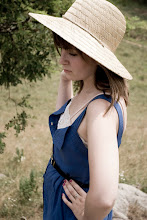Before jumping into the next poem there are a few side notes:
1. Since Janis likes the caviar idea so much I will share with you another snack that isn't very
 creative, but it still extremely delicious: fresh mozzarella, a little olive oil, and some salt sprinkled over top.
creative, but it still extremely delicious: fresh mozzarella, a little olive oil, and some salt sprinkled over top.2. Since I can buy alcohol in Italy, I would like to remind my readers that a little dab of Bailey's in a good cup of tea pushes it right over the edge into a semi-religious experience every time I have it.
3. Everyone should invest in an Enya CD - Paint the Sky with Stars is a good one to start. Also, Gregorian Chants are pretty great to listen to, not kidding.
Now for the poem. I'm not sure who I should choose today. The poets will definitely be Renaissance heavy, which you can blame on the classes I've taken so far at UVa. However, since my photography professor (I'm just going to start referring to him as Vassi, you'll remember) told me to take pictures of things I would normally right down, I think I'm going to choose two poems that are somewhat snapshots, and are not, strangely enough, from the Renaissance. These two untitled poems are by Sappho, a female, Greek poet from the Isle of Lesbos that lived around 600 B.C.
 Tonight I've watched
Tonight I've watchedthe moon and then
the Pleiades
go down.
The night is now
half-gone; youth
goes; I am
in bed alone.
I remember when I first read that poem in Comparative Literature, my first semester in college. It's not particularly complex, none of her poems really are. I'm not sure what this poem says to you, but I can really feel her sadness. It's not an overwhelming, crippling sadness, but a calm sadness she seems to put on every day like an article of clothing. She seems to be simultaneously describing the scene in which she finds herself to her reader, while also realizing herself that "the night is now half-gone." Every time I read this poem I feel the weight of this realization, feel the slump of her shoulders, the looming task of attempting to sleep. I think the main question is what she means by "youth." The answer to that question, though, depends on who you are. Does "youth" literally signify Sappho's youth and her realization that she is aging? Or has something just occurred that has sobered her youthful naivety? Is youth a specific person? I'll leave that up to you to decide.

The next poem, if you can call it that, is one I find very powerful, and also very intriguing. Sappho simply says,
And this I feel myself.
One must keep in mind that many of Sappho's poems have been lost through the vast amount of time they've been in existence, and most that we have are still only parts of the original. I'm not sure what I'd like to think about this line. Would I rather think of it as part of a larger poem, half of a line that tells us what exactly she's feeling, where she is, and why? I think I'd much rather picture Sappho feeling something that should couldn't quite articulate, sitting down, struggling to put something on the page, but only being able to write, "And this I feel myself." These five words are powerful because anyone can relate to them, whether the exact feeling is anger, confusion, betrayal, sadness, longing, love...anything.
I feel a connection to her here, through these 5 words, a literary photograph if you will, which makes me hopeful that words really can act as bridges between people, no matter how impossible the distance.
Trying to bridge the gap and sending my love...


1 comment:
When you write it down
Words hover above the page
Then sink deep below
Post a Comment